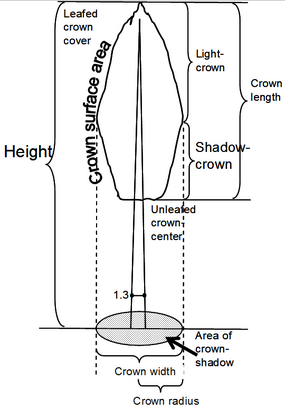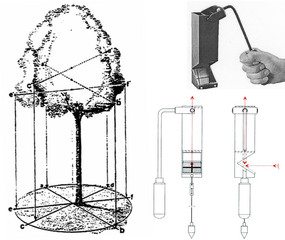Crown attributes
| (2 intermediate revisions by 2 users not shown) | |||
| Line 1: | Line 1: | ||
| − | {{ | + | {{Ficontent}} |
| − | + | ||
[[File:2.6.3-fig23.png|left|285px|thumb|'''Figure 1''' Illustration of some crown attributes (after Kramer & Akca 1986<ref name="kramer&akca1986">Kramer, H. and Akca, A. 1995. Leitfaden zur Waldmesslehre. 3rd Edition. J.D. Sauerländers Verlag, Frankfurt. 266p.</ref>).]] | [[File:2.6.3-fig23.png|left|285px|thumb|'''Figure 1''' Illustration of some crown attributes (after Kramer & Akca 1986<ref name="kramer&akca1986">Kramer, H. and Akca, A. 1995. Leitfaden zur Waldmesslehre. 3rd Edition. J.D. Sauerländers Verlag, Frankfurt. 266p.</ref>).]] | ||
The size of a [[Tree Definition|tree]] crown is strongly correlated with the growth of the tree as the tree crown is the part of the tree, which contains the photosynthesizing tissue, absorbs radiation and produces energy to enable the [[growth process]]es. | The size of a [[Tree Definition|tree]] crown is strongly correlated with the growth of the tree as the tree crown is the part of the tree, which contains the photosynthesizing tissue, absorbs radiation and produces energy to enable the [[growth process]]es. | ||
| − | Thus, measurements of the tree crown are some times made to assist in the quantification and understanding of tree growth. Almost all the attributes of tree size and growth rate are closely correlated, such as [[Tree diameter|diameter]], [[Tree height|height]], crown size, [[Stem volume|bole volume]], etc. The most common attributes of crown used in [[forest inventory]] are crown diameter (<math>k</math>) or crown radius, crown area, and crown length, as illustrated in Figure 1. | + | Thus, measurements of the tree crown are some times made to assist in the quantification and understanding of tree growth. Almost all the attributes of [[tree size]] and [[growth rate]] are closely correlated, such as [[Tree diameter|diameter]], [[Tree height|height]], [[crown size]], [[Stem volume|bole volume]], etc. The most common attributes of crown used in [[forest inventory]] are crown diameter (<math>k</math>) or crown radius, crown area, and crown length, as illustrated in Figure 1. |
From these measurements, various indices are derived that describe specific aspects of the shape of the crown, such as the crown ratio (crown length/tree height), the crown form index (crown length/crown width). | From these measurements, various indices are derived that describe specific aspects of the shape of the crown, such as the crown ratio (crown length/tree height), the crown form index (crown length/crown width). | ||
Latest revision as of 14:03, 27 October 2013

The size of a tree crown is strongly correlated with the growth of the tree as the tree crown is the part of the tree, which contains the photosynthesizing tissue, absorbs radiation and produces energy to enable the growth processes.
Thus, measurements of the tree crown are some times made to assist in the quantification and understanding of tree growth. Almost all the attributes of tree size and growth rate are closely correlated, such as diameter, height, crown size, bole volume, etc. The most common attributes of crown used in forest inventory are crown diameter (\(k\)) or crown radius, crown area, and crown length, as illustrated in Figure 1.
From these measurements, various indices are derived that describe specific aspects of the shape of the crown, such as the crown ratio (crown length/tree height), the crown form index (crown length/crown width).

The vertical crown projection to the ground can be made with the help of a mirror mounted on a gimbal with a sight that ensures a vertical reflection (Figure 2). The projection is then marked with pegs at various points (usually between 6 and 10) so that a projected crown polygon is created which can then be measured by azimuth and distance from some reference point. However, depending on how dense the accordant forest stand is, it can be very difficult to see the crown perimeter through the mirror of that device clearly. Under bad light conditions one can imagine that whether a branch belongs to a target tree or to a neighboring one is quite a challenging task!
Aerial photographs can also be used to map and determine the horizontal projection of tree crowns if single crowns can be clearly identified. Anyway, in closed forests it is often a major problem to define the boundary between the crowns of two neighboring trees.
Crowns can be very irregularly shaped. Therefore, clear definition is needed for all crown attributes; this refers above all to single “isolated” branches.
[edit] References
- ↑ Kramer, H. and Akca, A. 1995. Leitfaden zur Waldmesslehre. 3rd Edition. J.D. Sauerländers Verlag, Frankfurt. 266p.
- ↑ Kleinn, C. 2007. Lecture Notes for the Teaching Module Forest Inventory. Department of Forest Inventory and Remote Sensing. Faculty of Forest Science and Forest Ecology, Georg-August-Universität Göttingen. 164 S.